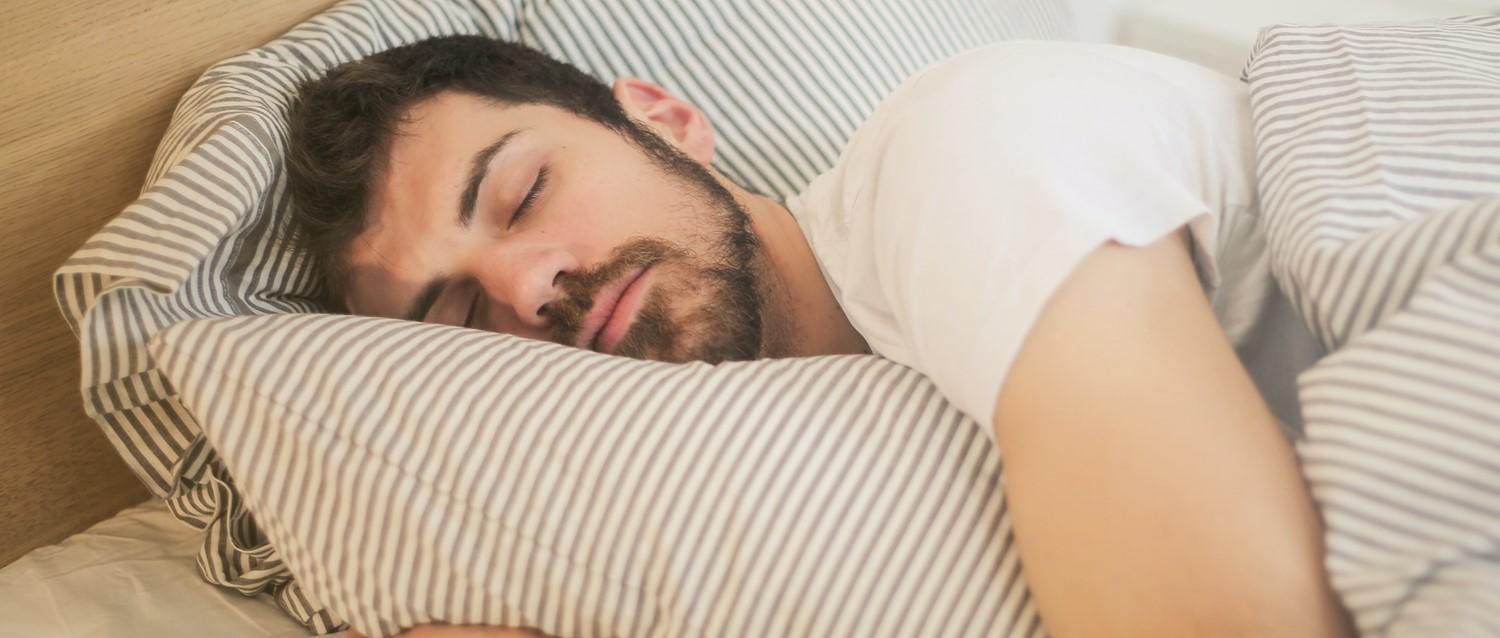
What causes sleepwalking and how can you stop?
Peer reviewed by Dr Sarah Jarvis MBE, FRCGPLast updated by Emily Jane BashforthLast updated 25 Apr 2022
Meets Patient’s editorial guidelines
- DownloadDownload
- Share
- Language
- Discussion
While sleepwalking can be something we joke about, it is a serious issue for many people. Sleepwalking can affect all aspects of someone's life, from their energy levels to their relationships. It is thought that sleepwalking is more common in children, but adults can and do suffer. However, sleepwalking can be managed.
In this article:
Continue reading below
What is sleepwalking?
Sleepwalking - also known as somnambulism - is a sleep disorder where someone gets up at night while still asleep. It is a type of parasomnia, which are conditions that occur in the grey area between being awake and asleep.
Sleepwalking is also a type of behavioural disorder. Other conditions which are classed as behavioural disorders include sleep talking, sleep terrors, and confusional arousals.
Sometimes, sleepwalkers just walk around. Other times, they will carry out activities, such as opening cupboards, eating, or getting dressed. People are generally thought to sleepwalk during the first few hours after falling asleep.
What can cause sleepwalking in adults?
Back to contentsDr Deborah Lee of Dr Fox Online Pharmacy explains that the exact cause of sleepwalking is not known. It occurs during stage 3 of the sleep cycle, which is deep, non-REM sleep. In REM sleep the muscles and body are very relaxed but the brain is more active - this is when dreams occur. NREM sleep (non-rapid eye movement) includes 3 stages, from stage 1 (the transition between waking and sleeping), through stage 2 to stage 3. Stage 3 is the deepest stage of sleep, when a sleeper experiences slowed breathing, muscle activity, heartbeat and brain waves.
However, there are factors associated with sleepwalking.
Sleep deprivation can lead to sleepwalking, for example. If someone is finally able to get some sleep, they might be more likely to fall into a deep sleep.
The risk of night-time awakenings can increase with factors such as having a temperature, sleep apnoea, gastric reflux, or drinking excess alcohol.
Additionally, stress and anxiety are well known for disrupting sleep. Any type of stress, from worrying about financial issues to not being able to relax if you are sleeping in a different bed while on holiday, can be what causes sleepwalking.
Finally, sleepwalking may be linked to certain medications. Dr Lee says that zolpidem (a sleeping pill used to treat insomnia) and various medications with a sedative effect can push people into a type of sleep that increases their chances of sleepwalking. Sedating antihistamines (such as chlorphenamine) can also interfere with someone's sleeping pattern.
Continue reading below
What can cause sleepwalking in children?
Back to contentsThe factors contributing to sleepwalking in adults can do the same for children. However, sleepwalking may be more common in children who don't have a regular sleep schedule.
Sleepwalking may also be seen in those with head injuries, migraines, or restless leg syndrome.
Fever has been found to trigger sleepwalking in children. Having an illness can make a child more likely to arise from slumber and walk around.
Is sleepwalking common in children?
Sleepwalking is actually more common in children than in adults. It can start at any age, but it is thought that 1 in 5 children will sleepwalk at least once. Most grow out of it by the time they reach puberty, but it can sometimes persist into adulthood.
A long-term study showed that over the ages of 2½ to 13 years, almost 1 in 4 (22.5%) of children whose parents had never been known to sleepwalk had sleepwalked. If one parent had a history of sleepwalking, this rose to almost 1 in 2 ( 47.4%) and more than 3 in 5 (61.5%) for children whose mother and father had a history of sleepwalking.
However, statistics around sleepwalking might not be completely accurate since most sleepwalkers do not remember their episodes. Therefore, it can be difficult to pinpoint exactly when and why they occur.
What happens when you sleepwalk?
Back to contents"After being in bed for 1-2 hours, the person will sit up in bed, with their eyes open and glassy. They will then get out of bed and start to walk around. They may do many different sorts of things, of which they have no memory in the morning," explains Dr Lee.
Activities while sleepwalking can include, but are not limited to:
Getting dressed.
Rearranging furniture.
Preparing a meal.
Leaving the house.
Passing urine somewhere strange (such as in a wardrobe).
Initiating sex.
She adds that injuries can occur while sleepwalking, for example, if someone falls down the stairs. Sleepwalkers have been known to open windows and jump out of them as they are unable to control their actions. While a sleepwalker might be talking, they will probably not be responsive to questions and, if they are, they won't remember what they said in the morning.
"Usually, a sleepwalker will then get back into bed and continue sleeping, and in the morning have no recollection of what happened. The episode may last up to 40 minutes, or longer," adds Dr Lee - although most episodes last for less than 10 minutes.
Sleepwalking during the night can cause someone to be more tired the following day.
Continue reading below
Should you wake someone who is sleepwalking?
Back to contentsWe have all heard the phrase, "You should never wake a sleepwalker," but this isn't necessarily true. However, attempts are often unsuccessful.
Dr Lee says the idea that it is dangerous to wake a person who is sleepwalking is a myth. But, it won't always be easy to wake them, since sleepwalking occurs during very deep sleep.
"If you do attempt to wake someone during a sleepwalking episode, they are likely to be disorientated and could hit out and injure you, or themselves."
It is generally recommended to gently coax a sleepwalker back to bed. You should try to cause as little disruption as possible and avoid making any forceful attempts so they do not become alarmed.
If you live with a sleepwalker, while you might struggle to wake them from an episode, you can minimise the risk of them harming themselves. Do this by:
Ensuring no objects are left lying around on the floor for them to trip over.
Locking windows and doors so they cannot get out easily.
Installing motion sensor lights.
Locking away sharp objects and weapons.
Use a stair gate (like a baby gate) to prevent them from falling down.
Use alarms, if necessary.
How to stop sleepwalking
Back to contentsFind ways to relax before bed
This might include having a hot bath, reading, or practising deep breathing exercises.
Have someone wake you before a sleepwalking episode
If you know the time when someone would usually get up to sleepwalk, gently waking them 15-30 minutes prior can help alter their sleep cycle.
Make sure you get plenty of sleep
This can be done in a number of ways. It might mean going to bed at an earlier time or tackling stressors in your life that are keeping you anxious and awake.
Consult a doctor to talk about potential sleep medicines
Dr Lee adds that, while medication can aid with sleepwalking, it is rarely necessary. This medication might include benzodiazepines or medicines originally designed to treat depression. All medication comes with both potential benefits and risks, therefore, you should consult a pharmacist before taking anything you are unfamiliar with.
Cognitive behavioural therapy (CBT) for sleepwalking
CBT is a form of talking therapy that aims to counteract negative thoughts and actions. CBT for insomnia (CBT-I) has been known to improve sleep quality by reframing how a person thinks about sleep.
You should attempt to address the underlying issues in someone's sleepwalking. This could mean stress management techniques, switching medications, or seeking a diagnosis and treatment for a condition.
Improving sleep hygiene is also a crucial factor in combatting sleepwalking. Therefore, as well as ensuring someone is relaxed before bed, you should also aim to improve their habits and environment. For example, a good mattress is key to getting a good night's sleep, as is a dark room, the correct temperature for sleep, correct positions and cutting out caffeine before bed.
When is sleepwalking a cause for concern?
Back to contents"In general, sleepwalking is not a big problem. For many people, it is a question of learning to live with it. However, there can be causes for concern that suggest someone needs help, particularly if they are sleepwalking often and it is greatly affecting their life," says Dr Lee.
Therefore, sleepwalking might be something to seek medical advice for if:
It is occurring more than 1-2 times a week.
The sufferer is excessively tired during the day.
It is waking up and causing upset to the whole household, or damaging relationships.
The sleepwalker is injuring themselves or others.
Patient picks for Sleep and insomnia

Healthy living
Is bed rotting helping or harming our health?
In the late 1960s, John Lennon introduced the world to ‘bed peace’. More than half a century later, beds are still being used to turn everyday rest into cultural statements or wellness trends. In recent years, TikTok has been flooded with the ‘bed rotting’ movement. We explain what it is, if it’s actually good for you, and whether it’s as gross as it sounds.
by Victoria Raw

Healthy living
Is sleep apnoea dangerous? When snoring problems turn serious
From grunts to loud snorts, 1 in 4 of us are in the habit of snoring as we sleep. Snoring on its own is usually nothing to worry about, but for some people, it is the main symptom of obstructive sleep apnoea. This is a breathing condition connected to sleep that can have some serious consequences if it's left untreated.
by Victoria Raw
Continue reading below
Article history
The information on this page is peer reviewed by qualified clinicians.
25 Apr 2022 | Latest version
25 Apr 2022 | Originally published

Ask, share, connect.
Browse discussions, ask questions, and share experiences across hundreds of health topics.

Feeling unwell?
Assess your symptoms online for free
Sign up to the Patient newsletter
Your weekly dose of clear, trustworthy health advice - written to help you feel informed, confident and in control.
By subscribing you accept our Privacy Policy. You can unsubscribe at any time. We never sell your data.